Shopify vs OpenCart: What’s the Perfect Fit for Your Business?
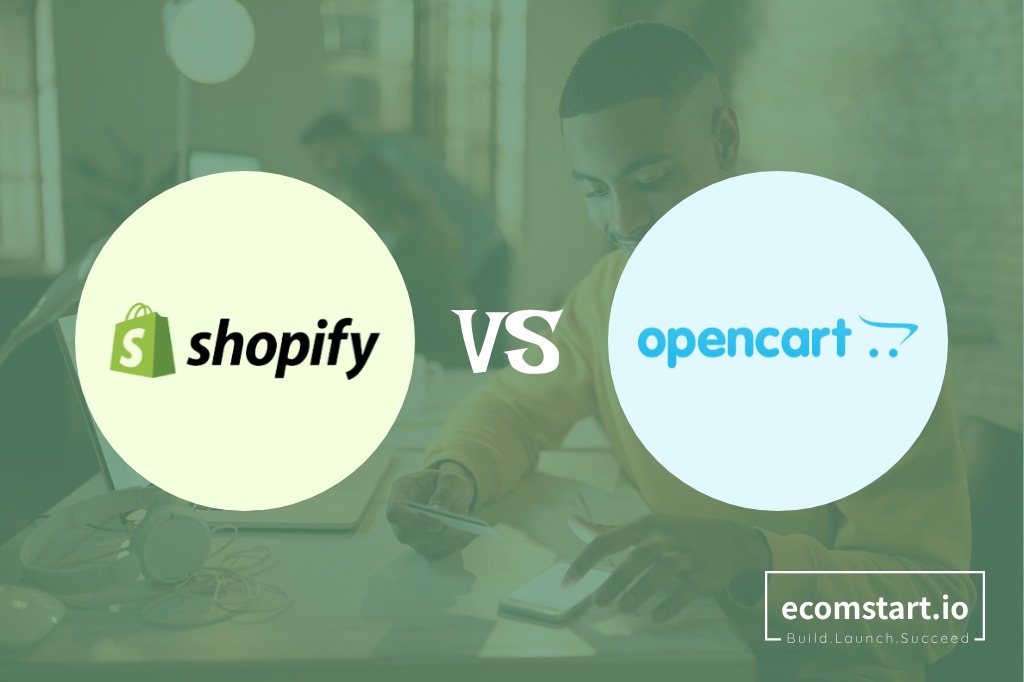
For many merchants, especially beginners and nontechies, eCommerce platforms, are indeed game-changers. They enable anyone with products to build and manage e-stores without requiring much coding knowledge.
During your research into platforms, Shopify and OpenCart likely impressed you with their popularity, ease of use, and a vast array of features. One takes the lead among hosted eCommerce platforms and one is one of the top-rated open-source website builders.
So which option is better for your business? You might be wondering. Check out this blog post for a comprehensive comparison between Shopify vs OpenCart so you can make an informed decision.
1. Key differences at a glance: OpenCart vs Shopify
Look at the table below for a quick comparison of OpenCart vs Shopify differences before diving into details.
| Shopify | OpenCart | |
| Definition | Shopify is a hosted eCommerce platform that empowers anyone, even non-tech-savvy ones, to set up and manage websites easily. | OpenCart is an open-source website builder that enables you to create an online store for selling products. |
| Rating | – Capterra: 4.6 (6,261 reviews) – G2: 4.4 (4,485 reviews) | – Capterra: 4.3 (148 reviews) – G2: 4.3 (103 reviews) |
| Pricing | – 4 pricing plans, namely: +) Starter ($5 monthly + 5% per sale if using Shopify Payment. The transaction fee will vary depending on the payment method you choose) +) Basic ($39 monthly or $29 yearly + 2% per sale if using external payment gateways) +) Shopify ($105 monthly or $79 yearly + 1% per sale if using external payment gateways) +) Advanced ($399 monthly or $299 yearly + 0.5% per sale if using external payment gateways) | – Free to download and install |
| Target audience | – Beginners or businesses of all sizes who: +) lack technical knowledge but prefer setting up and managing their store themselves | – Tech-savvy store owners who are comfortable with technical tasks – Medium businesses who want complete control over their stores and desire to scale the business |
| Design & customization | – 150+ themes – Contemporary, well-designed look + Regularly updated | – 1000+ themes – Out-of-date look + Irregularly updated |
| Ease of use | – Easy to install and use | – Technical know-how required |
| eCommerce features | – More built-in eCommerce features | – Not as many native eCommerce features as Shopify |
| Marketing tools | – Various native marketing features | – Lack of built-in marketing features |
| App & integrations | – 8,000+ apps | – 14,000+ extensions |
| Scalability | – Highly scalability | – Full control over store scalability |
| Pros | – Ease of use – A large section of curated extensions – Direct customer support | – Freedom to download and install – The ability to customize and scale their stores – A vast range of free and paid extensions |
| Cons | – Recurring subscription with transaction fees – Limitations in customization and scalability – Higher costs because of relying on extensions. | – Technical knowledge required – Lack of built-in features – Self-support |
Now that you’ve got the basics of the differences between Shopify vs. OpenCart. Let’s dive into all the aspects mentioned above.
Important note: Shopify is hosted, while OpenCart is self-hosted. This leads to differences in other aspects like pricing, ease of use, and scalability.

2. Is OpenCart or Shopify better: A deep dive comparison
2.1. Pricing
2.1.1. Shopify
Shopify comes with 4 main pricing plans to meet different business needs, including:
- Shopify Starter
- Shopify Basic
- Shopify
- Advanced Shopify
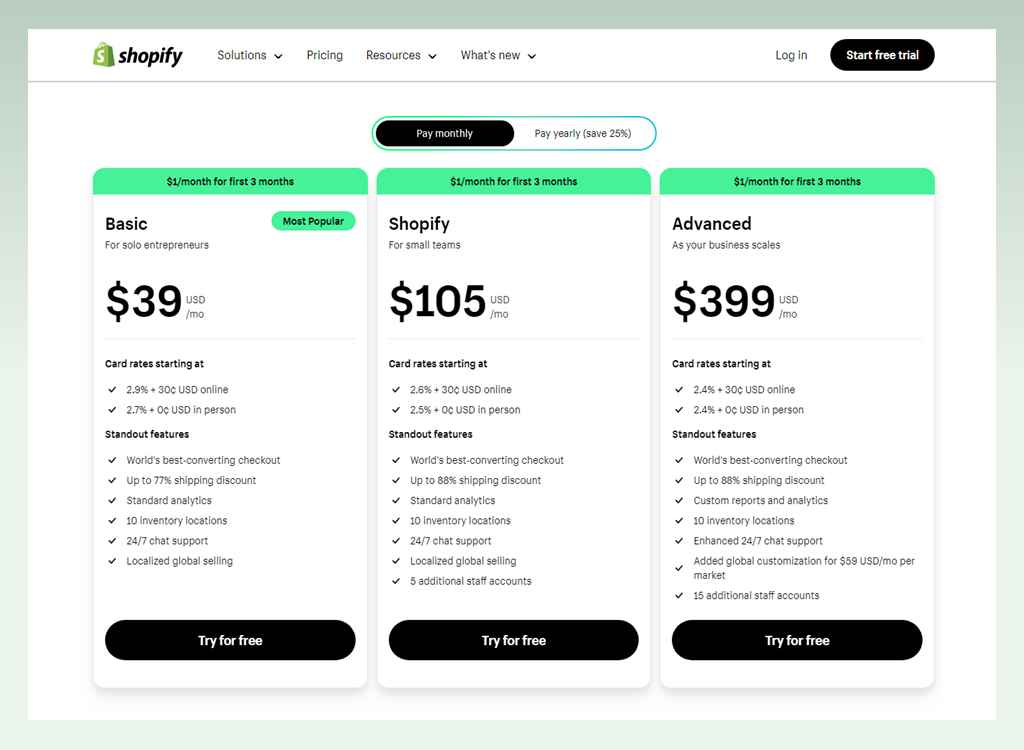
| Starter | Basic | Shopify | Advanced | |
| Monthly fee | $5 | $39 | $105 | $399 |
| Yearly fee | $29 | $79 | $299 | |
Transaction fee | 5% (applied when using Shopify Payments) | The transaction fees below are applied when you use an external payment gateway. Using Shopify Payments is fee-free. | ||
| 2% | 1% | 0.5% | ||
| Great for | Selling on social media platforms – The plan has limited features and is mobile-optimized. | Those who have a customer base | Growing businesses | Scaling businesses |
| Note | If you’re already on a different Shopify plan, you can’t switch to Shopify Starter. | |||
With these Shopify plans, you don’t need to deal with domain registration, SSL certificates, or web hosting separately, unlike open-source platforms. Everything is built-in for your convenience.
2.1.2. OpenCart
As aforementioned, OpenCart is an open-source platform. This means you can download and install it for free.
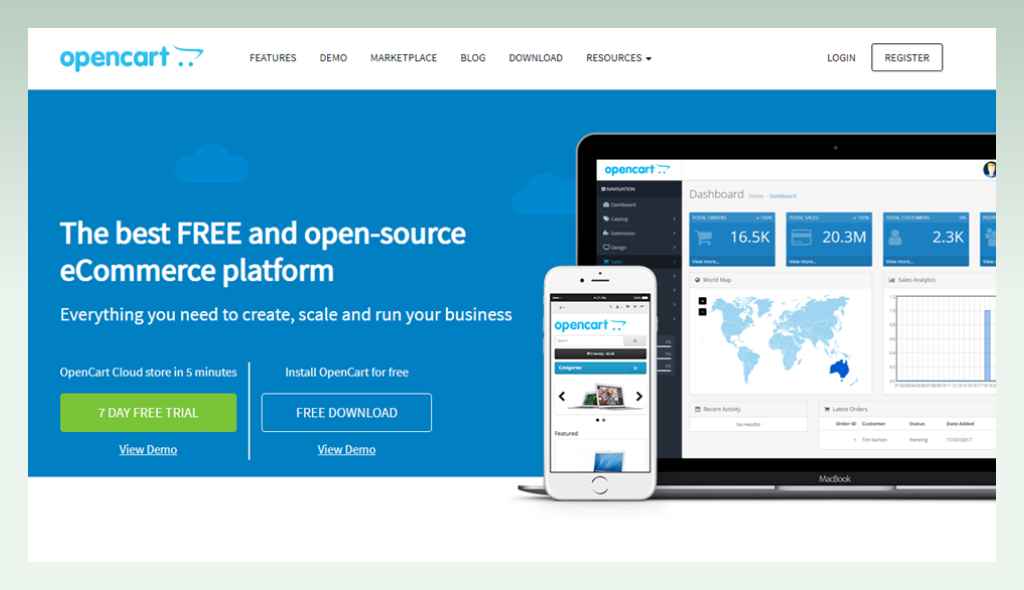
While OpenCart itself is free of charge, you’ll still have to pay for domain name, hosting, and any third-party extensions or themes that you might want to use.
Starting an online presence with an OpenCart website requires a monthly web hosting cost of $2 to $5. The fee may increase greatly as your business grows and expands. A (.com) domain registration usually costs around $10 to $15 per year on average while other domain extensions like .net or .org may have higher fees.
To enhance your store’s functionality, you can buy advanced extensions and themes or hire developers for customization. Paid extensions can cost between $20 and $500 or more. If you opt for a freelance developer, the cost may range from $20 to $100 per hour.
Who wins the the Pricing competition?
OpenCart is free to download, giving it a cost advantage. This open-source platform will be the winner if you’re a tech-savvy person who can handle tasks like picking a good hosting provider, software installation, and basic customization.
If you lack technical know-how, even though OpenCart is cheaper upfront, you might spend more hiring developers for your online store. In this case, Shopify is the better option.
Therefore, in the battle of Shopify vs Opencart cost, there isn’t a clear winner. It ultimately depends on your technical skills and requirements.
>>> Learn more: Shopify vs Weebly: Head-to-Head Showdown – Pricing, Features, and More
2.2. Design & customization
2.2.1. Shopify
Shopify has around 180 templates, which is fewer than the self-hosted platform. However, this doesn’t make Shopify less than OpenCart. Using Shopify, online merchants can still choose from a wide range of modern, visually appealing, and fully responsive themes.
One major advantage is that Shopify themes are consistently updated to match current eCommerce trends and the latest Shopify version.
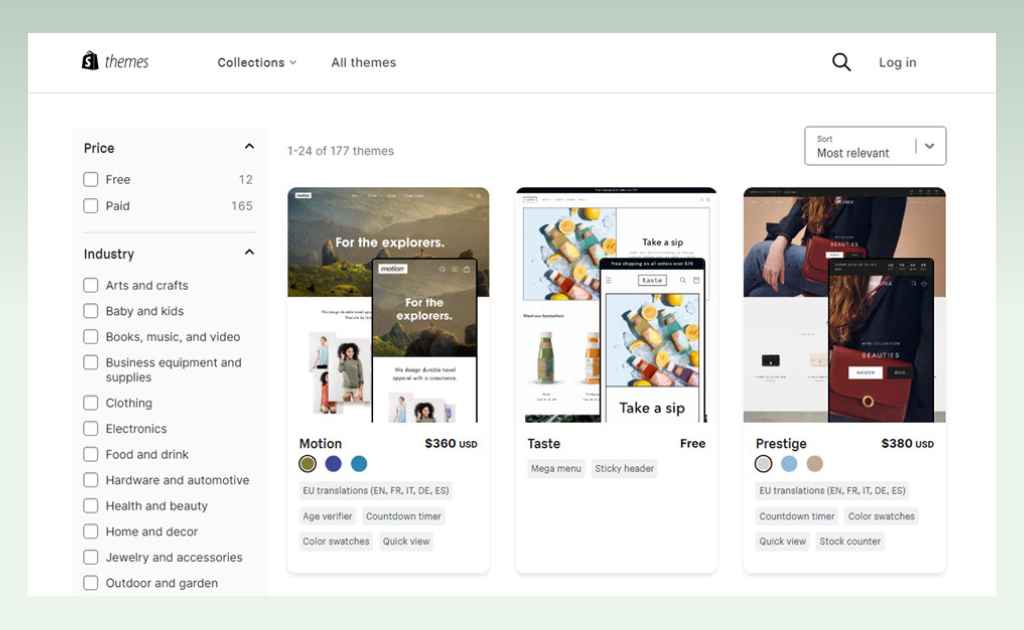
The hosted platform offers both free and paid themes. Even the free ones are well-designed with enough features. Premium themes have extensive customization options, minimizing the need for code adjustments.
→ You may also like: 12 Best Free & Premium Shopify Themes [2024]
2.2.2. Opencart
OpenCart offers store owners a variety of good-looking and functional themes for different devices. Currently, there are over 1,000 options on the OpenCart marketplace, giving users the freedom to choose their favorite theme.
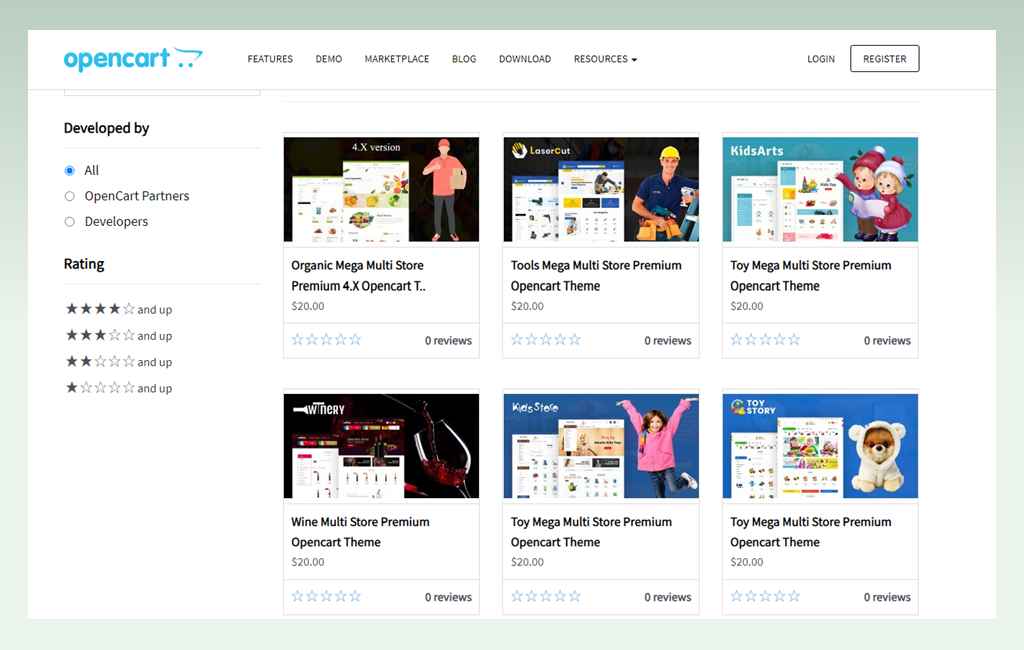
However, OpenCart themes don’t look as contemporary and polished as Shopify’s, many of which haven’t been updated regularly. This can make it challenging for users to find the right theme for their business. We recommend checking other theme marketplaces like Template Monster or ThemeForest for a variety of modern and visually appealing themes.
While OpenCart offers available customization settings for store management, marketing, products, etc., these alone are not enough for a comprehensive online store.
Users need to customize and modify the code if they want to enhance the store functionality. This poses a challenge for those unfamiliar with technical tasks. Of course, you can install extensions to do the job but they cost you more money.
Who wins in the Design & Customization battle?
Even though OpenCart provides numerous themes, Shopify outshines it with its high-quality, nice-looking themes that maintain consistent quality.
2.3. Ease of use
2.3.1. Shopify
You don’t need to worry about server setup, software installation, and updates because Shopify handles all of these for you.
Shopify comes with an intuitive drag-and-drop interface, allowing anyone even an average Jack or Joe, to create and manage their eCommerce store effortlessly. By dragging and dropping, you can easily change colors, fonts, or layouts any time you want, even without relying on developers.
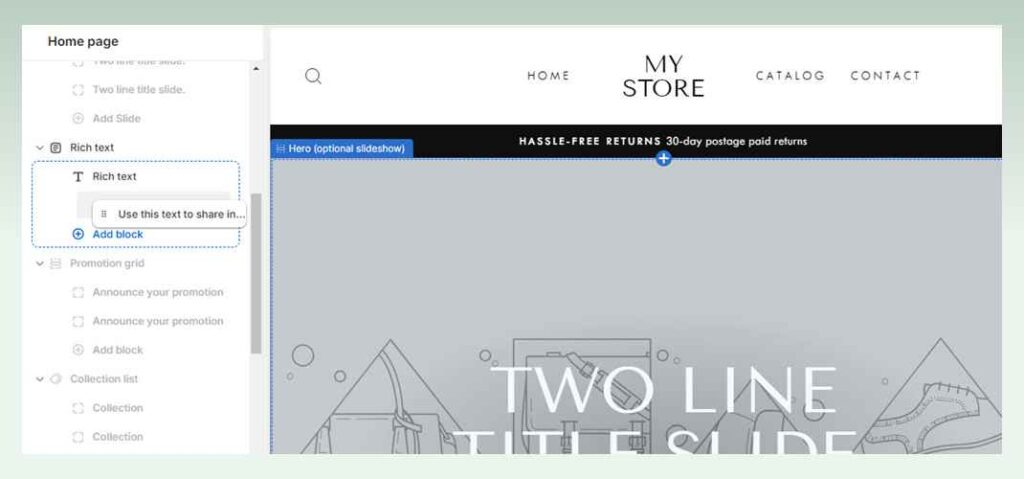
2.3.2. Opencart
Unlike Shopify, where the software is ready to use, OpenCart requires you to handle website hosting, security patches, software installation, and updates. This might be tricky for beginners without technical know-how.
However, just because you’re not tech-savvy doesn’t mean OpenCart can’t be your choice. Apart from the initial server setup, software installation, and customization (if any), it’s quite user-friendly. New online business owners won’t need to spend a lot of time getting used to it.
Shopify vs Opencart, which one is easier to use?
In terms of ease of use, Shopify is definitely the winner.
2.4. eCommerce features
2.4.1. Shopify
Shopify is an all-in-one solution with built-in eCommerce features that help merchants run their stores and sell products effectively.
Visiting the Shopify backend, you’ll be impressed with its user-friendly, well-organized dashboard so that you can have a full overview of all the important information.
The platform facilitates you in managing orders with a complete order management system, secure payment, and seamless mobile commerce.
Shopify offers various eCommerce features such as managing orders with a complete order management system, checkout abandonment, diverse payment methods, a range of integrations with major shipping carriers, mobile commerce, and more. So you can earn more customers and therefore sales.
Shopify provides a powerful analytics tool that lets you know how well your store performs. Therefore, you can easily keep track of traffic, customer behavior, and sales right on your Shopify store.
2.4.2. OpenCart
Generally, OpenCart is well-equipped with basic eCommerce features in terms of admin, categories and products, customers, shipping & payment, sales, and marketing.
The self-hosted platform has a straightforward dashboard that gives administrators a broad picture of your store performance such as total orders, sales, customers, and sales analytics.
When it comes to built-in sales and marketing features, Opencart is not as competitive as Shopify and other open-source platforms.
Although it doesn’t have its own payment gateway like Shopify, OpenCart has integration with 36 popular payment methods that help you payment process easily.
OpenCart closely integrates with plenty of major shipping suppliers, making it a breeze for merchants to generate custom shipping rates and rules. The platform gives users the ability to print shipping labels from their website backend.
OpenCart or Shopify, who is the winner in eCommerce features?
Shopify seeming holds the winning hand when it has more built-in eCommerce features.
2.5. Marketing tools
2.5.1. Shopify
The eCommerce platform already comes with powerful built-in marketing tools for important aspects such as SEO optimization, email marketing, social media integration, discounts and coupons, product reviews, etc.
Shopify provides a set of SEO tools to boost your visibility and ranking in search results. You can easily edit essential meta elements, namely the title tag and meta description, add alt text to images, generate sitemaps for easy crawling, and create redirects. All these features contribute to building a strong SEO foundation.
Shopify’s built-in blog feature is excellent for creating relevant content that attracts your target audience. As your traffic increases, you can use lead nurturing tools from the Shopify App Store to turn visitors into paying customers.
2.5.2. OpenCart
OpenCart’s built-in marketing tools are basic compared to Shopify or Magento. In the Marketing section, there are four subcategories – Marketing, Affiliates, Coupons, and Mail – each doing what its name suggests.
OpenCart doesn’t offer as many native SEO features as Shopify. While the platform has basic SEO tools like editing page titles, meta descriptions, and adding alt text for images, users have to utilize advanced extensions or custom development for more functionalities.
For example, OpenCart itself does not generate sitemaps or have a built-in blog feature. To gain this functionality, you’ll have to install a dedicated extension or customize codes.
Who wins in the Marketing feature competition?
Definitely, Shopify outshines OpenCart in marketing features.
2.6. App & integrations
2.6.1. Shopify
Shopify packs with more than 8,000 robust apps, both paid and free, allowing store owners to enhance their store’s functionality in various aspects such as management, design, fulfillment, and marketing.
For example, the standard Shopify doesn’t offer a tool to check whether your web pages are SEO-friendly. In this case you’ll need to use a dedicated app like Yoast SEO.
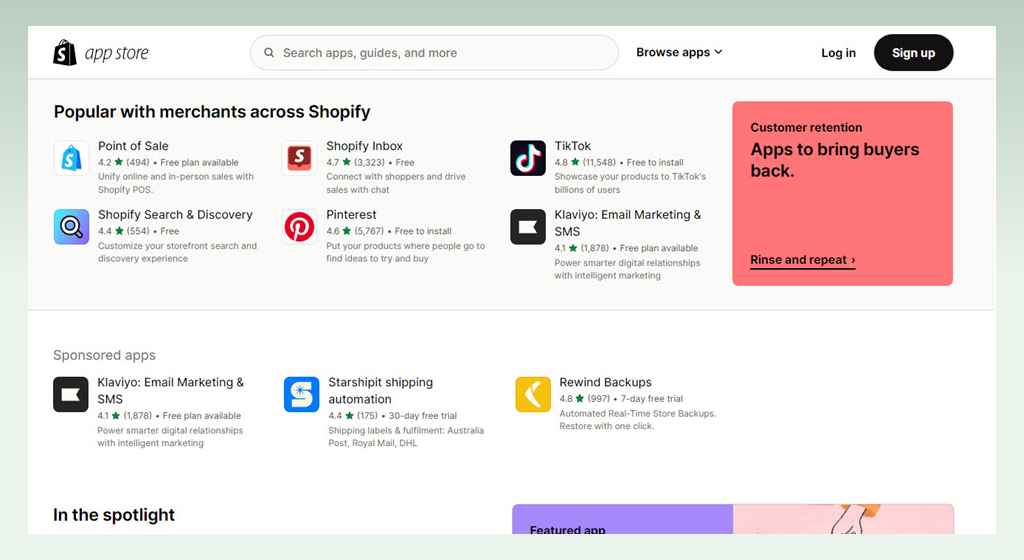
To purchase various secure and compatible apps, you can visit the Shopify App Store. The marketplace is well-designed, and with its search function and categorized apps, Shopify users can quickly find what they’re looking for.
Shopify apps are easy to install and integrate. With just some clicks, you can quickly add the feature to your online store.
>>> Learn more: Shopify vs Printify: Who Rules the Print-on-Demand Realm?
2.6.2. OpenCart
The OpenCart marketplace is home to more than 14,000 extensions, covering a wide range of features to enhance your store’s functionality—in terms of themes and design, payment security, marketing and sales, shipping and fulfillment, etc.
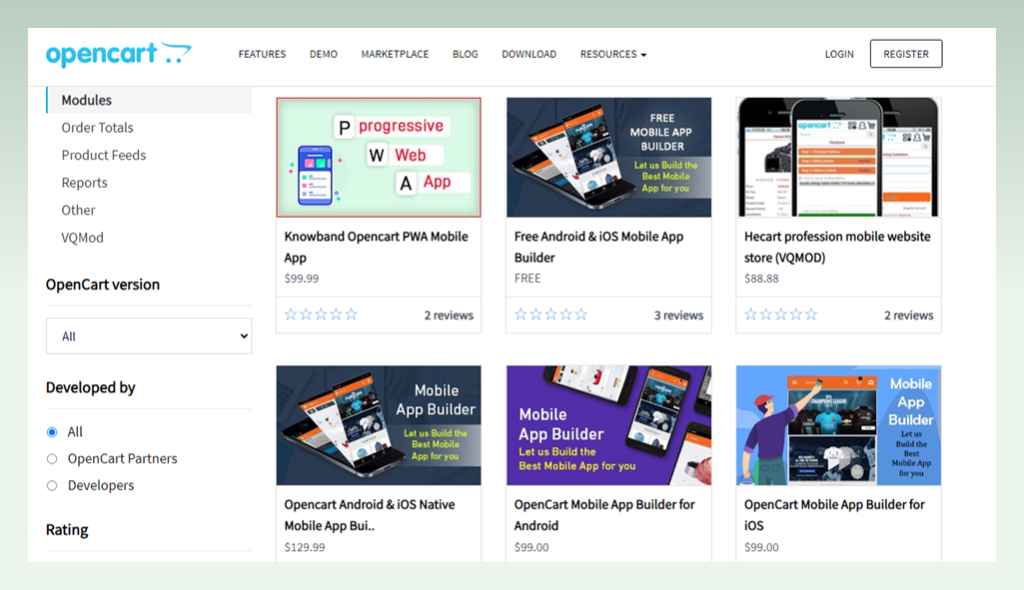
OpenCart extensions usually require a one-time payment, making them more cost-effective in the long run compared to Shopify’s monthly and yearly app subscriptions.
The open-source platform provides many free and premium extensions, accessible even for those with limited budgets. However, setting up extensions on your OpenCart store could be a hurdle for nontechies because it requires basic technical know-how.
The OpenCart extension marketplace doesn’t look as modern as the Shopify App Store. While it’s easy to look at, finding specific extensions is tricky since they’re not categorized properly. On a positive note, OpenCart offers filtering, sorting options, and a search function, making it easier to discover extensions.
OpenCart vs Shopify, who is the winner?
OpenCart is the winner of the Apps & Integrations battle because of its extensive range of extensions, surpassing Shopify.
2.7. Scalability
2.7.1. Shopify
Scalability in an eCommerce platform means it can manage an increasing workload—such as larger products, traffic, and transactions—while keeping the website running stable and smoothly.
Shopify is a hosted platform, so your scalability depends on your subscription. When your website gets busy, your current plan might struggle. This case, you’ll need to upgrade your subscription for more server space and bandwidth, which can be inconvenient and costly. If you don’t foresee significant growth, you might miss the right time to upgrade your Shopify plan.
Shopify provides various apps and themes, but sometimes none of them match your needs. Additionally, Shopify doesn’t allow direct changes to the core platform code, limiting your business’s potential to grow.
| More eCommerce platform comparison reviews you may be interested in: – Shopify vs Wix 2024 – Shopify vs Weebly 2024 – Shopify vs Volusion 2024 |
2.7.2. Opencart
Unlike Shopify, OpenCart is self-hosted, meaning you have significant control over your e-store. This means you have more control over your store, with direct access to the code and themes. You can customize them as your business grows without relying on the provider.
OpenCart empowers you to handle server upgrades. This gives you the flexibility to make necessary adjustments, especially for temporary needs.
Who is the winner in the Shopify vs OpenCart scalability competition?
With a huge advantage as an open-source platform, OpenCart is the winner for sure.
3. Shopify vs OpenCart: Who holds the winning hand?
Now that you’ve got a basic handle on these two eCommerce platforms. Let’s review their pros and cons to decide whether Shopify or OpenCart is better for your business.
3.1. Shopify’s pros & cons? Ideal for which businesses?
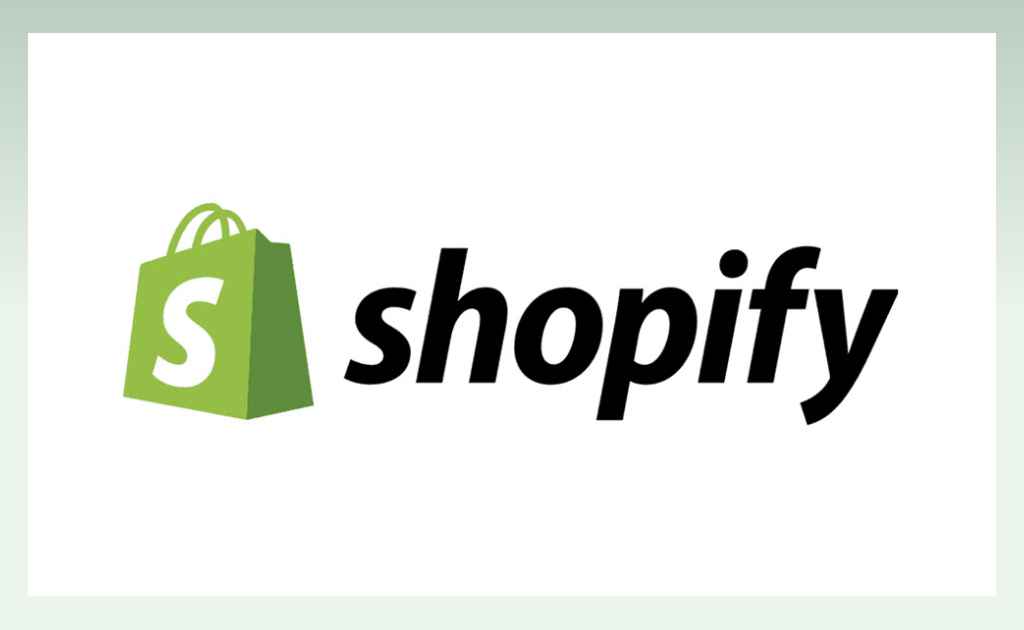
Pros:
- Shopify, as a hosted platform, handles everything from servers to security and updates. This allows users who aren’t keen on technical tasks can focus on doing non-technical ones like customizing the theme or selling products.
- Shopify is a user-friendly platform. With the ease of installation and an intuitive drag-and-drop interface, anyone can install the software and quickly learn how to use it with a bit of practice.
- The hosted platform has many extensions that make it easy for users to enhance their store’s features.
- Shopify users can contact customer support through live chat, phone, or email whenever they need help.

Cons:
- Shopify has monthly or yearly subscriptions, and there are transaction fees for each sale unless you use Shopify Payments, which might be challenging for small businesses in the long run.
- While Shopify users don’t have to worry about hosting and security, they might find it challenging to adjust the server for high traffic and orders during busy times.
- You can control some front-end code, but the ability to access and customize the codebase is limited. Instead, you need to buy and install third-party apps, which can raise monthly expenses.
Choose Shopify if you’re new to online business, lack technical knowledge, and prefer setting up and managing your store yourself without relying much on developers.
Shopify is great for businesses of all sizes that want a user-friendly, hassle-free eCommerce solution. If you’re a large enterprise requiring advanced features and scalability, consider Shopify Plus, the premium version.
🤔 Considering options beyond Shopify? Explore the best Shopify alternatives for more choices and find the ideal fit for your online store’s success.
3.2. OpenCart’s pros & cons? Ideal for which businesses?
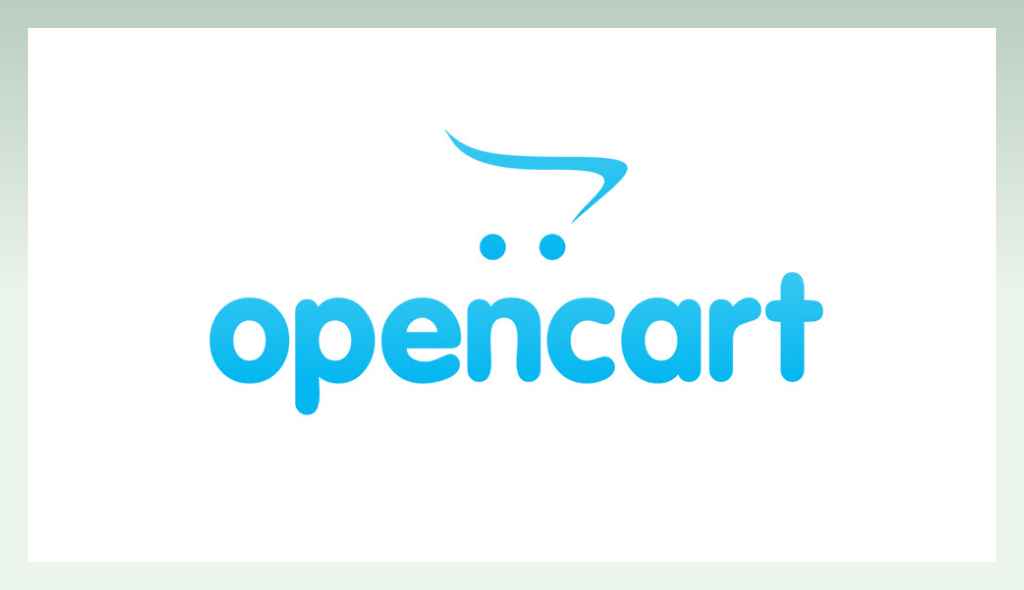
Pros:
- Users can download and install this open-source platform for free. They also have the flexibility to choose reliable and affordable providers for hosting, domain names, and security.
- OpenCart is open-source, allowing users to directly access the source code for customizing their store’s function and design. If you’re tech-savvy, you won’t need to spend money on advanced extensions.
- Without OpenCart, you can easily customize everything – from hosting to security – to meet your specific needs, especially during busy seasons or business growth.
- The platform has many extensions, both free and paid, giving users plenty of options to choose from.
Cons:
- Using the platform requires some technical knowledge, such as managing hosting, and security, installing software, customizing the storefront, and updating the software.
- OpenCart doesn’t come with as many built-in features as platforms like Shopify and Magento, so users often need to rely on extensions or custom development.
- OpenCart, like other open-source platforms, doesn’t have direct customer support. Users find help by asking questions and searching for solutions in the OpenCart community forum or documentation.
Choose OpenCart if you’re tech-savvy and can manage servers. For those who aren’t comfortable with technical tasks but don’t want to hire a developer, Shopify is a better option. OpenCart suits those who want full control over their stores and scalability.
4. The bottom lines
Is OpenCart or Shopify better? Both Shopify and OpenCart have their own pros and cons. By carefully considering these aspects and evaluating your business needs, you can choose the eCommerce platform that best suits your business.
That’s all for now. Should you have any questions, feel free to leave your comment below.
By the way, follow the topic on eCommerce Platform Comparison at eComStart.io for straightforward, well-researched reviews.
5. FAQs


